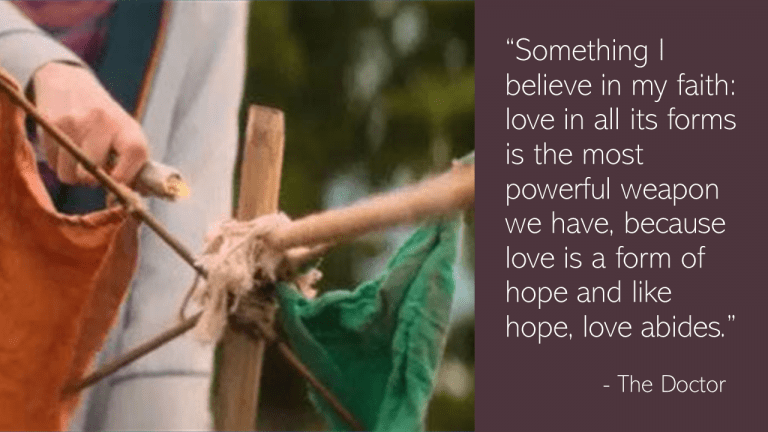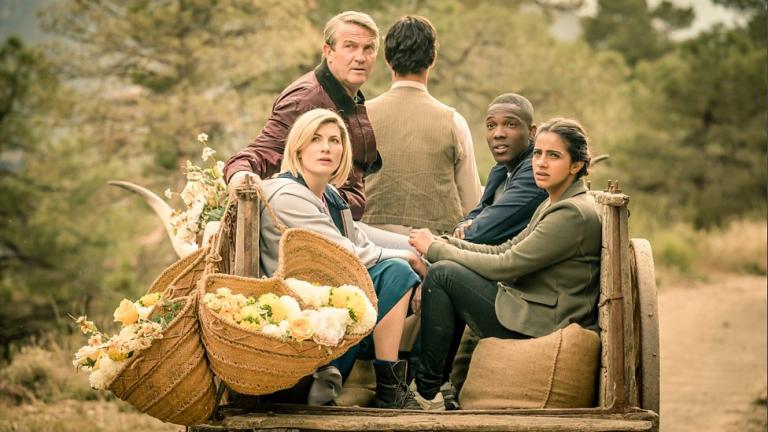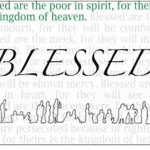The episode “Demons of the Punjab” was incredibly moving. I’ve visited India but not Pakistan. For some years, I taught a course on South Asian Civilizations, in which we read the novel Train to Pakistan. I had a lump in my throat at many points during this emotionally powerful story set against the backdrop of real events.
The story begins in the present day at Yaz’s grandmother’s birthday party. We learn that Umbreen, her grandmother, was the first woman to get married in Pakistan after its creation, and then later, the first Muslim to work in a textile mill in South Yorkshire. She gives Yaz a watch which has cracked glass, telling her that it must never be fixed, for reasons Yaz would not understand. The grandmother adds, “I have such stories I could tell you.” Yaz is eager to know more, and says, “Your life’s our heritage.” Yaz then turns to the Doctor to try to find out more, asking, “What’s the point of having a friend with a time machine if you can’t nip back and see your grandmother when she was young?” The Doctor, however, is initially very cautious because of the risks involved in crossing paths with one’s own ancestors. As she puts it later, “You could interfere yourself out of existence…Tread softly, you’re treading on your own history.”
The story seems to presuppose viewers have some familiarity with the historical events that are taking place in 1947, but provides at least just enough for those who may not. There are radio snippets such as Lord Mountbatten announcing the creation of Pakistan. The Doctor mentions that tens of millions will be displaced and over a million killed. But much more is provided through the story’s characters themselves. The tensions between Muslims and Hindus, which Yaz finds run through her family and her grandmother’s story, if not perhaps her own ancestry. It turns out that her grandmother married right after the creation of Pakistan was announced, even before the official map had been released. And her new husband, a Hindu, was killed by other Hindus for protecting his Muslim wife and mother in law.
An important character (even though he is in the background and then killed) is the sadhu, a Hindu holy man, whose name is said to be Bhakti, which is a term for devotional poetry. He comments on how young people are always in such a rush (taking a cart instead of walking). Bhakti was the only person willing to marry the couple from mixed religious backgrounds. He is killed by Manush, the brother of Prem (the groom), in an effort to try to prevent the marriage. But the Doctor steps in and performs the ceremony, in what is one of the coolest things in all of Doctor Who history, for someone with my interests at least. Here’s part of what the Doctor says:
Something I believe in my faith: love in all its forms is the most powerful weapon we have, because love is a form of hope and like hope, love abides.
They do a Hindu ritual using rope, then a Muslim one in which Prem gives his bride Umbreen a watch. He drops it and it breaks. But while I appreciate the exploration of religious diversity in India and the way colonial powers turned longtime neighbors into enemies – but not all of them – my attention was obviously drawn to the Doctor’s talk of her faith. It isn’t the first time this has come up – see the episode The Curse of Fenric for more on that topic. But it is rare. There is a bit of comedy – the Doctor says she hasn’t officiated a wedding since Einstein’s. But on a more serious note, she says that the ceremony will be “non-denominational,” which is a striking word choice.
 In the midst of all the interpersonal and historical drama, some “demons” show up, who are of course aliens. When they get into their ship, the humans comment that it is beautiful, which prompts the Doctor to reply, “They can surprise you…demons.” She eventually recognizes them as from the Vajarian Hive, a race of assassins. The Doctor says they are an ancient species, which evolved themselves into deadliest assassins in the known universe. Prem had seen them before, as a soldier in Singapore. They had been standing over his older brother’s dead body. Prem took a pendant of Hanuman from around his brother’s neck, but in his fear, he left the body there. When the aliens return to their ship and find the intruders, they say, “You have desecrated the hive. The hive is sacred.”
In the midst of all the interpersonal and historical drama, some “demons” show up, who are of course aliens. When they get into their ship, the humans comment that it is beautiful, which prompts the Doctor to reply, “They can surprise you…demons.” She eventually recognizes them as from the Vajarian Hive, a race of assassins. The Doctor says they are an ancient species, which evolved themselves into deadliest assassins in the known universe. Prem had seen them before, as a soldier in Singapore. They had been standing over his older brother’s dead body. Prem took a pendant of Hanuman from around his brother’s neck, but in his fear, he left the body there. When the aliens return to their ship and find the intruders, they say, “You have desecrated the hive. The hive is sacred.”
Later in the episode, the Vajarians explain themselves to the Doctor. “We are not assassins…We have changed…We are witnesses.” After their homeworld was destroyed, they underwent a reformation of their ways. The dust they carry with them is all that remains of their people, their genetic material, remnants of a war in which they died unsaved, and unwitnessed. The remaining Vajarians now they seek out the unacknowledged dead, those who otherwise would die alone. Their mission is to honor life as it passes. When the Doctor suggests that they not merely watch what is doomed to happen – Prem will die – the Vajarians say, “We are not gods. Events sit as they will. They can only be witnessed…The fixed force of time cannot be stopped.” The Doctor says to that last statement, “I know.”
There are other details that are of interest for those who want to explore religion on Doctor Who. The statement that “Bakhti taught me the scriptures,” and that he was the only one who would agree to marry a Muslim and a Hindu. The tendency to explain misfortune and the surprising in terms of curses.
As the violence that results from partition is getting closer, the observation is made that “There’s nothing worse than when ordinary people lose their minds” – when Hindu, Muslim, Sikh become persuaded that what divides them is greater than what unites them. “Our families have worked the land alongside each other for generations.” On the other hand, Manush is said to spend too much time reading pamphlets, and listening to angry men on the radio. That last point hits home particularly powerfully in relation to our own time.
But the most powerful line in the whole episode is when Prem goes out to face down his own brother and other Hindus who are bent on killing Muslims. When the Doctor offers to go with him, Prem says, “No. These are demons I have to face alone.”
And so that’s the powerful message of this episode, one that has been a recurring theme on Doctor Who, but rarely presented as compellingly. The demons, the monsters, are as often us humans as aliens.
 There are other thought-provoking lines, beyond the ones I noted above. The focus on family history of course connected with me. But it also highlighted the difference between lived history and what a grandchild (for instance) doing research might discover. Graham sagely remarks that “A woman’s allowed to have secrets even from her granddaughter.” And he also insightfully asks, “Do any of us know the truth of our own lives, while living them from the inside?”
There are other thought-provoking lines, beyond the ones I noted above. The focus on family history of course connected with me. But it also highlighted the difference between lived history and what a grandchild (for instance) doing research might discover. Graham sagely remarks that “A woman’s allowed to have secrets even from her granddaughter.” And he also insightfully asks, “Do any of us know the truth of our own lives, while living them from the inside?”
Near the end of the episode, we see that the inside of the Vajarian spaceship is like a cathedral to those who die alone, their holograms floating above their heads beneath the domed ceiling.
Different music played over the end credits. This is not the first time that has been done on Doctor Who. But it is rare. So much in this episode was rare, and yet so much of it felt like classic Doctor Who, with the historical focus that was so much more characteristic of the earliest seasons than much later ones.
For me, the episode was a compelling and deeply moving combination of everything I love most about Doctor Who. Interesting material about both human and Gallifreyan religion. Serious commentary about individual lives, history, morality, and the value of life. And so I truly loved it, and expect it to be one that I’ll continue to talk about often among my favorite episodes.
What are your thoughts about “Demons of the Punjab”?













